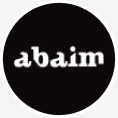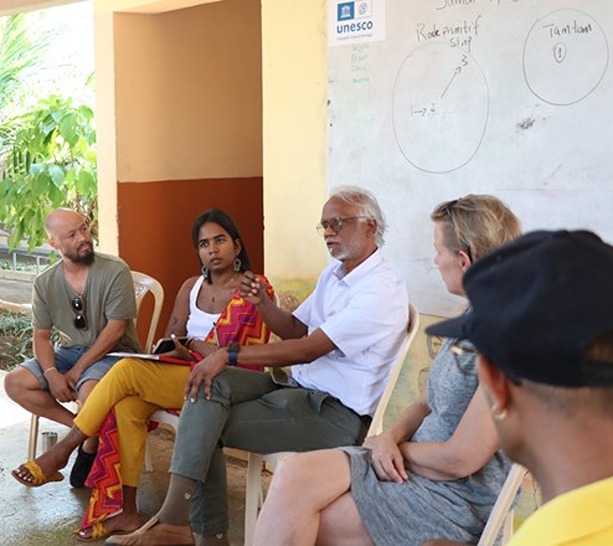
ABAIM
ABAIM is an association dedicated to promoting human rights through a philosophical approach. For over 40 years, ABAIM has contributed to various initiatives addressing major societal issues through impactful creative and cultural activities. The primary projects, "Saturday Care" and its counterpart "Sunday Care," embody the spirit of the association by engaging children, youths, and their parents in weekend activities that inspire and uplift them. These activities offer opportunities for self-expression through free speech, storytelling, play, music, and various other creative ways.
In addition to these projects, ABAIM is recognised for its work in preserving intangible cultural heritage, producing educational materials in Kreol Morisien (Mauritian Creole), and creating musical works. The organisation also extends its activities to regions like Le Morne and Grand Baie, ensuring a broader reach and impact. ABAIM's holistic approach integrates social, economic, psycho-pedagogical, and cultural actions to advance the well-being of vulnerable people, particularly children and the blind, with significant parental involvement.
Accreditation Number with the National Social Inclusion Foundation: N/1024


Saturday Care Project
Launched in 1995, Saturday Care takes place every Saturday from 10:45 AM to 4:30 PM. The day is divided into several sub-workshops and focused on fostering the holistic development of children. This is achieved through:
- ‘Lakonpagnman Skoler’ programme, which offers educational support that respects the children’s rights to expression and the use of the mother tongue, Kreol Morisien.
- A children's assembly, helping the beneficiaries to express their views and share information.
- Creative workshops, including theatre, painting, modelling, storytelling, dance, and crafts.
- ‘Zwe lontan’ workshops, comprising of traditional games, board games, and free play.
- Music workshops whereby various music activities are offered.
- Lunch and snack preparation with collective help from the children and their mothers.
- Leadership development by encouraging children to take on responsibilities by becoming "Ti ankadrer."
The organisation primarily welcomes children from the Barkly region in Beau-Bassin, as well as from Cassis, Richelieu, Chebel, Camp Levieux, and a few from organisations such as SOS Children’s Villages and La Fondation pour l’Enfance Terre de Paix.
Group ABAIM Music Workshop
Recognising culture as a powerful tool for capacity building and combatting poverty, the music workshop, which has now evolved into a performing arts platform, gave rise to the musical group 'Group ABAIM' in 1988. Over the past 30 years, the group has incorporated contributions from individuals with disabilities initially and subsequently included children from the Saturday Care programme as well.
The ABAIM group is celebrated for its unique intergenerational composition, iconic songs, and long-standing presence in the local cultural landscape of Mauritius. The group is also recognised for its role in preserving and disseminating children's folk stories and songs, which serve as a means of fostering connection, exchange, and understanding within the island.
Rehearsals are held twice a week in the early evenings.
Research and Pedagogical Material Creation
ABAIM performs an original repertoire that has facilitated the development of various educational materials and practices focused on the holistic development of individuals. The group has published 15 albums and 9 books, thanks to extensive data collection and intensive fieldwork within communities. These works are trilingual and frequently require reprinting.
Support for the Blind
From its inception, ABAIM has been instrumental in raising public awareness about the inherent value and dignity of blind individuals, emphasising their integration into society.
Lekol Ravann Music Workshop
Established in 1986, Lekol Ravann offers courses to both youths and adults through a pedagogical method that teaches them to play the ravanne and the basics of Sega Tipik, a UNESCO World Heritage cultural practice. Drawing on over 30 years of experience, Lekol Ravann has shared its knowledge through the book "O ti le la la E ravann," which includes a musical notation system for learning the instrument.
Additionally, every Saturday from 1 PM to 2 PM in Barkly, Beau Bassin, the school offers lessons in flute, guitar, and other percussion instruments for children.
Positive Parenting
The projects implemented by the association have provided opportunities to work closely with parents who often struggle to cope with difficult emotional and/or economic situations. Formal and informal meetings, active listening, continuous dialogue, training sessions, and sustained support have helped these parents adopt a nurturing approach, enabling them to better support and raise their own children as well as those in the community.
As a result, parents have become decision-makers, participating in the association's decision-making and operational processes.
Ti Lantrepriz Sosial
Ti Lantrepriz Sosial is a wonderful space for development and finding a profession. This social enterprise in Barkly has been created to provide training to young residents of the neighbourhood in the creation of traditional instruments that are becoming increasingly rare. It also fosters appreciation and enhances integration during visits from both Mauritians and international visitors.
The enterprise is managed by a parent of former Saturday Care beneficiaries. The products created are available for purchase at Ti Laboutik, trezor pei d’ABAIM, and Super U stores.
Leisure and Sports Activities
The leisure activities reflect the integrative nature of the association. We organise outings that blend leisure and education, enabling blind individuals, children from the Saturday Care programme and their parents to connect and foster better integration. Sports activities are included in the agenda as an excellent means of rehabilitation and holistic development. These activities integrate seamlessly with our educational objectives, reinforcing the comprehensive range of services we offer.
To date, children who started with the programme have become members of the association's board of directors. The remarkable success of this initiative stands as one of the most compelling examples of successful community projects in Mauritius. Today, the project is actively embraced by both children and parents, with the association providing guidance and support.
Beneficiaries: ABAIM's initiatives benefit a diverse group of individuals, including 300 children aged 5 to 18 years, and 25 young adults aged 19 to 30 years. Additionally, 200 parents and caregivers, along with 12 individuals with disabilities, receive support through various programmes and activities.
ABAIM is a non-governmental organisation founded in 1982, emerging from a support front for blind workers during a heroic strike-occupation at the Lois Lagesse Centre. Since its inception, the organisation has adopted a rights-based approach to conceptualise and achieve its objectives, grounded in a philosophy and democratic principles essential for building a better society.
Initially focused on supporting the struggle of blind individuals, ABAIM has gradually shifted its efforts toward vulnerable children, emphasising social and cultural rights. Since 1995, ABAIM has implemented the "Saturday Care" project, providing children with opportunities to express themselves through free speech, storytelling, play, music, and various other creative activities.
In 2020, ABAIM was accredited by the UNESCO Convention for the Safeguarding of the Intangible Cultural Heritage. This recognition underscores ABAIM's commitment to preserving and disseminating elements of Mauritius' intangible heritage. The organisation has become a reference in producing pedagogical materials in the Mauritian Creole language and creating musical works.
Throughout its history, ABAIM's main objective has been to make human rights work for people, firmly believing in democracy and any struggles that improve society at large. By integrating the focus on vulnerable children with cultural heritage preservation, ABAIM has created a holistic approach that benefits both individuals and the community as a whole.
The objectives of ABAIM, as defined in the association's statutes, are to contribute to the establishment of a new social order by:
- Strengthening social services and launching collaborative actions with other organisations to optimise and rationalise the resources involved.
- Acting as a social advocacy body, raising community awareness on issues related to human development and human rights.
- Serving as a community think tank, designing and initiating actions in collaboration with public and private authorities and non-governmental organisations to promote sustainable social development.
- Encouraging social solidarity and autonomy by promoting the concept of mutual aid and self-sufficiency, ensuring the economic independence of disabled individuals, particularly those who are visually impaired.
Additionally, ABAIM is committed to organising and participating in workshops and debates to foster a society free from all forms of discrimination and to promote the secularisation of social services and social development.
- Over 40 years of existence as a social organisation with a strong cultural vocation.
- Creation of avant-garde projects at the forefront of child development, such as Saturday/Sunday Care, Lakonpagnman Skoler, Lekol Ravann (school for teaching the ravanne) and Ti lantrepriz sosial (the small social enterprise).
- Major contribution to the development of the curriculum for the introduction of Mauritian Creole in grades 10 and 11 and contribution to the writing of the Mauritian Creole textbook for grade 10, in collaboration with the Mauritius Institute of Education (MIE).
- Accreditation under the 2003 UNESCO Convention for the Safeguarding of the Intangible Cultural Heritage - 2020
- Publications on research, collection, revitalisation, and dissemination of the intangible heritage of the Republic of Mauritius in the field of oral tradition.
- Multiple national and international awards recognising the organisation's contributions and achievements.
- National Social Inclusion Foundation (NSIF)
- Sales of media products: Albums, CDs, DVDs, and books.
- Sales of traditional instruments such as the ravanne and maravanne.
- Musical performances
- Corporate Social Responsibility (CSR) Funds
- Other donations






